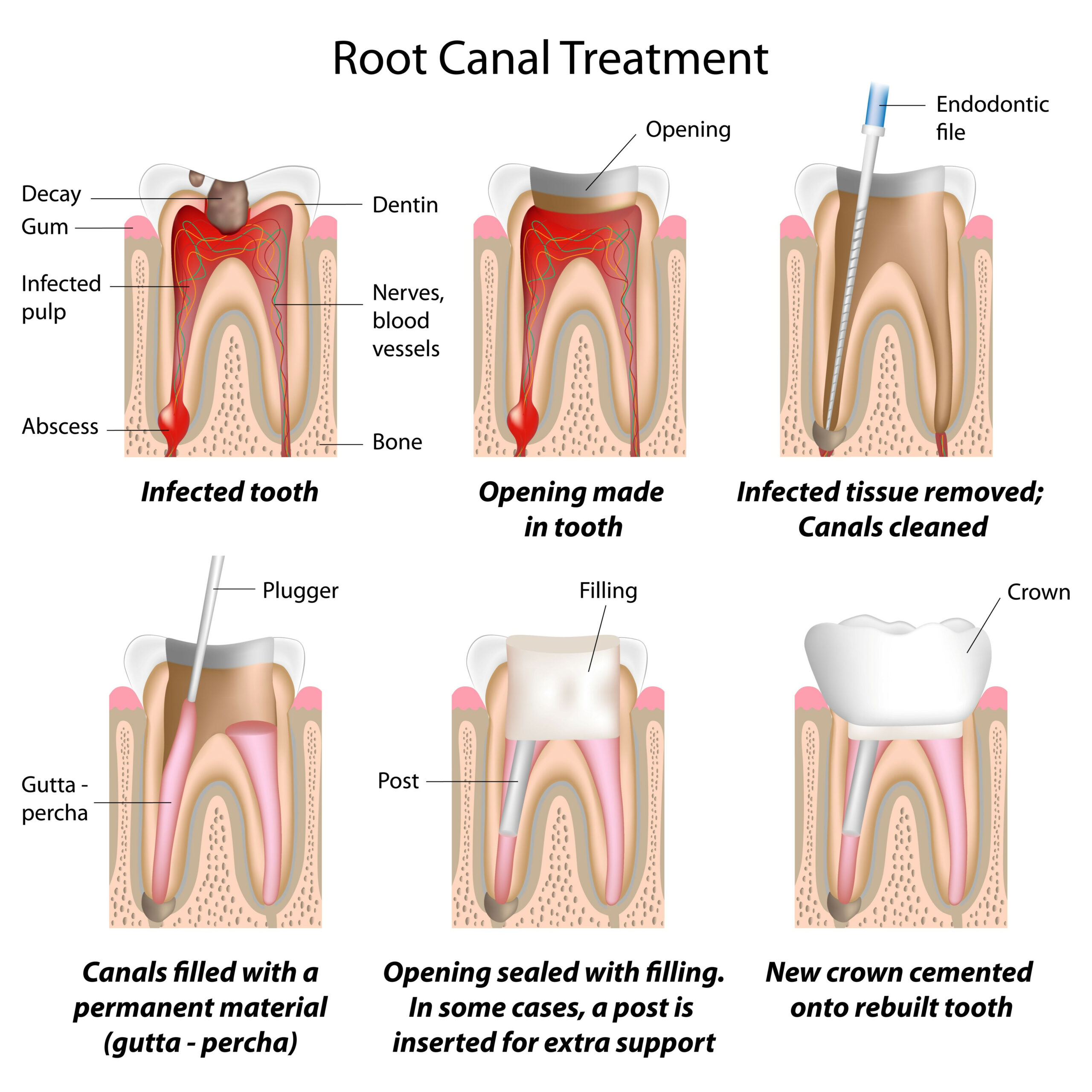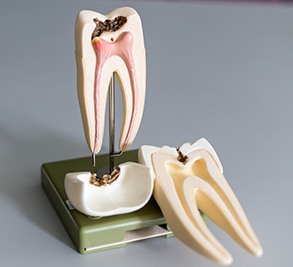Restoration Root Canal Therapy
Misconceptions surrounding the endodontic specialty abound. Few other terms in the English language are so immediately associated with fear and pain like the word ‘root canal’. With the advances in dental techniques, these associations are nothing more than false stereotypes. Understanding root canals and the therapy used to correct disorders and disease will help to disprove these wrongful assumptions.
Root canal misconceptions have been present for many years. The truth is that those who have experienced root canal therapy realize there is little to fear. A recent study by the American Association of Endodontists found that:

“Patients who have experienced root canal therapy are six times more likely to describe it as “painless” than patients who have not had root canal treatment.”
Today’s treatment is more closely related to placing a filling. In fact by treating damaged tissues inside the root canal, the severe toothache most patients experience is actually relieved. This improves the comfort of the patient and the overall health of the tooth and mouth.
The Purpose of the Root Canal
Root canal therapy procedures are necessary because of two main issues. The first reasons involve inflammation and infection of the tooth. The second are due to traumatic injury rendering the pulp unable to recover.
Inflammation and infection can damage the tooth’s pulp. This occurs when cavities and tooth decay allow bacteria to breach the enamel and dentin.

Accidental trauma to the tooth can also damage the pulp. Many times when chips, cracks or fractures occur, pulp is injured and not capable of recovery. This type of injury can even occur when a tooth has undergone many restoration efforts. Pulp can even be injured with no visible cracks or chips.
Root Canal: Signs of Damaged Pulp
There are dangers associated with leaving damaged or infected pulp untreated. These conditions will lead to sensitivity, pain and even an abscess. These are the signs and symptoms of damage that should get further examination:
- Pain with biting or contact to the tooth
- Hot/Cold sensitivity
- Swelling around the tooth
- Discoloration of the tooth
It is possible to have pulp damage without the presence of pain. If you suspect your tooth is inflamed, injured or infected, you should consult the dentist immediately.
Benefits of Root Canal Therapy
When possible, saving natural teeth offer patients the very best options. The treatment is less invasive and costly than other options. Root canal therapy effectively saves an estimated 24 million teeth each year.
Restored teeth can last a lifetime with proper care and regular dental checkups. This type of treatment has an extremely high success rate. As long as the root of a restored tooth remains nourished, it should continue to remain healthy.
Root Canal Therapy Treatment
We believe in providing our patients with the highest quality of care, and part of our commitment to your oral health involves collaborating with trusted endodontists for the restorative phase of root canal therapy.
OUR COLLABORATIVE APPROACH:
Diagnosis and Consultation: When you visit our dental practice with a dental issue that may require root canal therapy, Dr. Ueckert & Associates will assess your condition and determine the need for a root canal. If a root canal is recommended, we will discuss the procedure with you and explain the process in detail.
Referral to an Endodontist: In cases where the root canal therapy is necessary, we will refer you to a trusted and specialized endodontist. Endodontists are dental professionals who have undergone extensive training and specialization in the treatment of the dental pulp and root canal procedures.
Specialized Care: Your endodontist will perform the root canal procedure with the highest level of precision and expertise. They will focus on removing the infected or damaged pulp, cleaning the root canal system, and ensuring that your treatment is thorough and effective.
Open Communication: We maintain a strong line of communication with the endodontist to ensure your seamless care. This collaborative approach allows us to stay informed about your treatment progress and coordinate your follow-up care effectively.
Restorative Phase: After your root canal treatment by the endodontist, you will return to our dental practice for the restorative phase. Dr. Ueckert & Associates will assess the tooth’s condition and recommend the most suitable restoration, typically a crown, to protect and strengthen the treated tooth.
Tailored Care: We understand that each patient’s needs are unique. Dr. Ueckert & Associates will work closely with you to customize the restorative treatment plan, ensuring the crown’s color, shape, and fit seamlessly match your natural teeth.
Continued Care: Following the placement of the crown, we will schedule follow-up appointments to monitor your progress, assess the success of the treatment, and ensure your long-term oral health.
Our collaborative approach with trusted endodontists ensures that you receive the best of both worlds – specialized root canal expertise and comprehensive restorative care – all within a seamless and coordinated treatment plan. Your comfort and well-being are our top priorities, and this approach helps us provide you with the most effective and comfortable root canal therapy

